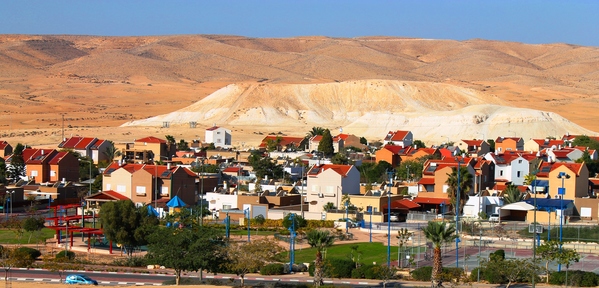On a small wonder and desert towns – Judy Maltz in Haaretz:
‘In mid-September, when the list of coronavirus hot spots in Israel seemed to be growing by the hour, one small desert town managed to buck the trend.
Over a period of two weeks, the number of active cases among the roughly 11,000 residents of Yeruham had dropped by more than half: from 100 to just over 40. This sudden drop was duly noted by other municiaplities in Israel, eager to learn from Yeruham's example.
Much of the credit for this southern Israeli town’s swift turnaround is being attributed to its young and energetic mayor. Rather than sit around and wait for instructions from Jerusalem, Tal Ohana decided to take matters into her own hands.
“We decided we would assume full responsibility, and that made a huge difference,” the 36-year-old, first-time mayor told Haaretz in her office this week.’
(…)
‘Because a majority of its residents are religious or traditional, Yeruham has a large synagogue-going population. Ohana says she understood that if they were allowed to pray indoors over the High Holy Days in September, she would have had a disaster on her hands.
After she secured the consent of local rabbis, two days before Rosh Hashanah, all synagogues in town were closed until further notice. That was a full two weeks before they were closed nationwide.
This might not have been possible were it not for the excellent working relations she enjoys with these local rabbis and her ability to get them on board with her plans.’
(…)
‘When a member of the local gym was discovered to have tested positive, the Health Ministry notified the municipality that, based on its findings, there was no reason to close the facility. The council thought otherwise and immediately took action.
Within a matter of days, it turned out another three members of the gym had tested positive. By ignoring the recommendations of the ministry and closing the gym immediately, the municipality was able to contain any further spread of the virus.’
(…)
‘When Ohana assumed her new role, she asked that all the pictures and certificates hanging on the walls of her office be removed. All except one. It’s a photo of four elderly women, taken in one of the local parks. “These women were part of the founding generation,” Ohana relays. “I keep this picture here to remind me where I came from and where I’m going.”
Tall and slim, she wears her hair cut in an elegant bob. Dressed for the office in skinny jeans and spike-heeled burgundy pumps, she definitely doesn’t come across as a religious woman. But don’t let looks fool you, she says.
Ohana is strictly kosher and observes Shabbat. In fact, when she needs to notify members of the community on Shabbat that they’ve tested positive for COVID-19, she walks to their homes to deliver the news, because driving is forbidden on the Jewish day of rest.
“What really draws me to Judaism,” she says, “is the tradition – the idea that I’m a link in a long chain, and that even if my ancestors didn’t know how to read or write, they loved the Torah. They were simple, good people who were believers.”
Entering national politics is definitely on her agenda, but not yet. “It isn’t the right time,” she says, volunteering that she’s already received offers from different parties. “I still have a responsibility to this place, and there are all sorts of projects I started – which had to be put on hold for now – that I’m determined to see through to the end.”’
(…)
‘The recent confrontation between the anti-Netanyahu protesters and the Prime Minister's supporters, wasn’t the first time such a face-off has taken place in Israel in recent months. But here’s what makes Yeruham unique: The following day, after they exchanged nasty remarks on the local Facebook group, representatives of the two political camps convened in person for a truce. A photo of the meeting was published on the same Facebook group, and the posts that had upset everyone were deleted.
Last Saturday evening, the local anti-Netanyahu group intended to join the national protests again. But then they were presented with a special request to postpone their plans by a day so as not to disrupt the small celebration in town to mark the Simhat Torah holiday. The protesters agreed.
They were also asked if they could refrain from waving black flags at the protests, because some of the town’s residents had taken offense. Again, they agreed – making clear, however, that they had no intention of softening their anti-Netanyahu message.
The protest was eventually held on Sunday night. As they had the previous week, Netanyahu supporters showed up and held a counterprotest. This time, it was less acrimonious. The face-off ended with both sides singing the national anthem in unison.
Is it any wonder they beat the Coronavirus?’
Read the article here.
I’m skeptical about the power that governments have in fighting for example a pandemic, they can do a few things, but they cannot provide miracles.
As this article once again illustrates, the smaller the community the more effective a government or a municipality or a mayor, as in this case, can operate.
Trust is key, and the realization among opponents that they share a space, a community and a future.
Without his realization polarization quickly becomes nasty.
